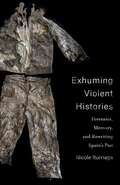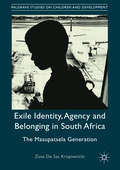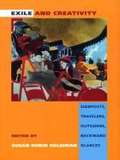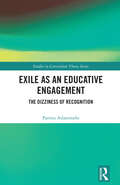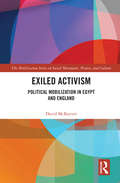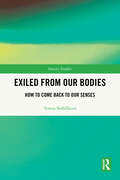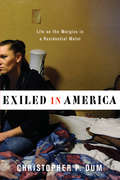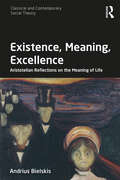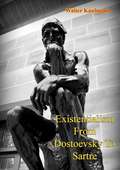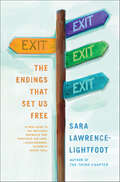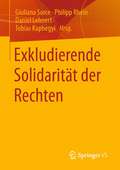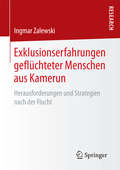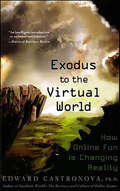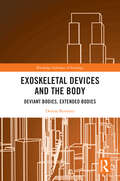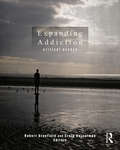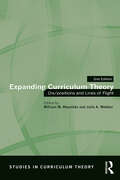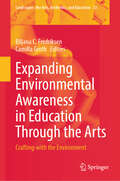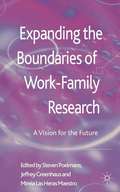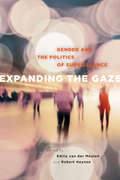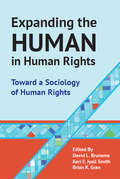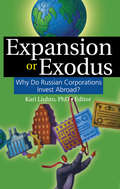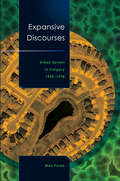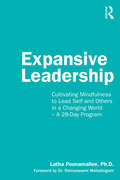- Table View
- List View
Exhuming Violent Histories: Forensics, Memory, and Rewriting Spain’s Past
by Nicole IturriagaMany years after the fall of Franco’s regime, Spanish human rights activists have turned to new methods to keep the memory of state terror alive. By excavating mass graves, exhuming remains, and employing forensic analysis and DNA testing, they seek to provide direct evidence of repression and break through the silence about the dictatorship’s atrocities that persisted well into Spain’s transition to democracy.Nicole Iturriaga offers an ethnographic examination of how Spanish human rights activists use forensic methods to challenge dominant histories, reshape collective memory, and create new forms of transitional justice. She argues that by grounding their claims in science, activists can present themselves as credible and impartial, helping them intervene in fraught public disputes about the remembrance of the past. The perceived legitimacy and authenticity of scientific techniques allows their users to contest the state’s historical claims and offer new narratives of violence in pursuit of long-delayed justice.Iturriaga draws on interviews with technicians and forensics experts and provides a detailed case study of Spain’s best-known forensic human rights organization, the Association for the Recovery of Historical Memory. She also considers how the tools and tactics used in Spain can be adopted by human rights and civil society groups pursuing transitional justice in other parts of the world. An ethnographically rich account, Exhuming Violent Histories sheds new light on how science and technology intersect with human rights and collective memory.
Exile Identity, Agency and Belonging in South Africa
by Zosa De Sas KropiwnickiThis book examines the experiences of 49 second-generation exiles from South Africa. Using “generation” as an analytical concept, it investigates the relational, temporal and embodied nature of their childhoods in terms of kinship relations, life cycle, cohort development and memory-making. It reveals how child agents exploited the liminal nature of exile to negotiate their sense of identity, home and belonging, while also struggling over their position and power in formal Politics and informal politics of the everyday. It also reflects upon their political consciousness, identity and sense of civic duty on return to post-apartheid South Africa, and how this has led to the emergence of the Masupatsela generational cohort concerned with driving social and political change in South Africa.
Exile and Creativity: Signposts, Travelers, Outsiders, Backward Glances
by Susan Rubin SuleimanA major historical phenomenon of our century, exile has been a focal point for reflections about individual and cultural identity and problems of nationalism, racism, and war. Whether emigrés, exiles, expatriates, refugees, or nomads, these people all experience a distance from their homes and often their native languages. Exile and Creativity brings together the widely varied perspectives of nineteen distinguished European and American scholars and cultural critics to ask: Is exile a falling away from a source of creativity associated with the wholeness of home and one's own language, or is it a spur to creativity?In essays that range chronologically from the Renaissance to the 1990s, geographically from the Danube to the Andes, and historically from the Inquisition to the Holocaust, the complexities and tensions of exile and the diversity of its experiences are examined. Recognizing exile as an interior experience as much as a physical displacement, this collection discusses such varied topics as intellectual exile and seventeenth-century French literature; different versions of home and of the novel in the writings of Bakhtin and Lukács; the displacement of James Joyce and Clarice Lispector; a young journalist's meeting with James Baldwin in the south of France; Jean Renoir's Hollywood years; and reflections by the descendents of European emigrés. Strikingly, many of the essays are themselves the work of exiles, bearing out once more the power of the personal voice in scholarship.With the exception of the contribution by Henry Louis Gates Jr., these essays were originally published in a special double issue of Poetics Today in 1996. Exile and Creativity will engage a range of readers from those whose specific interests include the problems of displacement and diaspora and the European Holocaust to those whose broad interests include art, literary and cultural studies, history, film, and the nature of human creativity.Contributors. Zygmunt Bauman, Janet Bergstrom, Christine Brooke-Rose, Hélène Cixous, Tibor Dessewffy, Marianne Hirsch, Denis Hollier, Henry Louis Gates Jr., Linda Nochlin, Leo Spitzer, Susan Rubin Suleiman, Thomas Pavel, Doris Sommer, Nancy Huston, John Neubauer, Ernst van Alphen, Alicia Borinsky, Svetlana Boym, Jacqueline Chénieux-Gendron
Exile as an Educative Engagement: The Dizziness of Recognition (Studies in Curriculum Theory Series)
by Parmis AslanimehrThis book explores the concept of exile, experienced not as a physical displacement but as a subjective experience of disconnection from the Other. It further clarifies the notion of exilic subjectivity, whereby a hidden facet of the self—ineffable both to the Other and to the Self—causes a distance between self-comprehension and external perception. In doing so, it poses a challenge to recognition theory’s assertion that self-understanding occurs through interactions with Others. Engaging with the writings of Georg Wilhelm Friedrich Hegel, Charles Taylor, Axel Honneth, Søren Kierkegaard, and Rumi, the book explores the difficulties individuals encounter when transitioning their inwardly focused private identities into public spaces, such as educational institutions. It emphasizes the critical role educators can play in cultivating an atmosphere of attentive listening attuned to the unique experiences that may exile the self. Through the complex interplay of writings by thinkers such as Hegel, Kierkegaard, Rumi, Taylor, and Pinar, this work transcends traditional theories of recognition. Rather than resolving misrecognition, it embraces it as a central aspect of the human condition, examining the tension between self-perception and external acknowledgement. The text phenomenologically investigates “seeing” the Other and the risk of misrecognizing an individual’s innermost depths. These insights find resonance in academia, where even amid success, a chasm may persist, isolating students and educators from each other. As the self dwells in the uneasiness of estrangement, the discussion welcomes the ownership of silence and inwardness into the classroom. From this detached perspective, the possibility of recognizing the convergence of familiarity and strangeness before and within oneself may emerge.This book is tailored for scholars, educators, and readers interested in the intersections of philosophy, education, and lived experience. It offers readers innovative approaches to understanding exile and recognition, fostering deeper engagement with the complexities of identity, alienation, and the self.
Exiled Activism: Political Mobilization in Egypt and England (The Mobilization Series on Social Movements, Protest, and Culture)
by David McKeeverThis book examines the relationship between exile and activism. Drawing on interviews with activists exiled to England following the military coup d’état in Egypt as an illustrative case, it considers whether exile presents any barrier to meaningful political participation. Through a comparison of activism in Egypt with exiled activism in England, the author explores the mechanisms mediating the changes in the activists’ activities, tracing the conditions for exile in institutions of dictatorship and shedding light on the process by which activism is decertified and fear of repression becomes internalised within a movement - a process that is counteracted in the sanctuary and stability of a host country in which activist networks are founded and the exile repertoire is expanded. A significant contribution to social movement theory, this book will appeal to sociologists and political scientists with interests in political mobilisation and contentious politics.
Exiled From Our Bodies: How to Come Back to Our Senses (Sensory Studies)
by Tereza StehlíkováIn an era where digital devices increasingly mediate our perception of reality, this book explores the tension between the richness of direct sensory experience and the allure of the screen. It examines how our growing dependence on virtual spaces and visually dominant media has led to a disconnect from our bodies and environment, contributing to a sense of alienation — both personal and ecological. Drawing on an autoethnographic approach, artistic research methods and ethnographic interviews with experts across numerous disciplines, this book argues for the continuing importance of lived, embodied, multi-sensory experience. It considers how the arts, rather than merely reinforcing technological mediation, can actively subvert the passivity imposed on our subjectivity by the latter — offering creative strategies to re-engage with the world through all our senses. By using artistic processes to navigate the tension between the virtual and the real, the book explores how creative practices can generate new ways of seeing, feeling and understanding. At its core, this work suggests that to even begin to address the current environmental crisis, we must first return to our bodies and come back to our senses — literally and figuratively. Through artistic experimentation, philosophical inquiry and sensory exploration, it proposes a reawakening to the reciprocity between body, technology and environment, offering a pathway towards a more conscious, engaged and aesth-ethical way of inhabiting the world.
Exiled in America: Life on the Margins in a Residential Motel
by Christopher P DumResidential motels have long been a place of last resort for many vulnerable Americans-released prisoners, people with disabilities or mental illness, struggling addicts, the recently homeless, and the working poor. Cast aside by their families and mainstream society, they survive in squalid, unsafe, and demeaning circumstances that few of us can imagine.For a year, the sociologist Christopher P. Dum lived in the Boardwalk Motel to better understand its residents and the varied paths that brought them there. He documented how life in the motel affected their goals and dreams. As told through the voices and experiences of motel residents, Exiled in America paints a portrait of a vibrant community whose members forged identities in response to overwhelming stigma and created meaningful lives despite crushing economic instability. Dum witnessed moments of violence and conflict, as well as those of care and community. Throughout, he presents a powerful counterforce to the myths and stereotypes that often plague marginalized populations.In addition to chronicling daily life at the Boardwalk, Dum also follows local neighborhood efforts to shut the establishment down, leading to a wider analysis of legislative attempts to sanitize shared social space. He suggests meaningful policy changes to address the societal failures that lead to the need for motels such as the Boardwalk. The story of the Boardwalk, and the many motels like it, will concern anyone who cares about the lives of America's most vulnerable citizens.
Exiled in America: Life on the Margins in a Residential Motel (Studies in Transgression)
by Christopher DumResidential motels have long been places of last resort for many vulnerable Americans—released prisoners, people with disabilities or mental illness, struggling addicts, the recently homeless, and the working poor. Cast aside by their families and mainstream society, they survive in squalid, unsafe, and demeaning circumstances that few of us can imagine. For a year, the sociologist Christopher P. Dum lived in the Boardwalk Motel to better understand its residents and the varied paths that brought them there. He witnessed moments of violence and conflict, as well as those of care and compassion. As told through the voices and experiences of motel residents, Exiled in America paints a portrait of a vibrant community whose members forged identities in response to overwhelming stigma and created meaningful lives despite crushing economic instability. In addition to chronicling daily life at the Boardwalk, Dum follows local neighborhood efforts to shut the establishment down, leading to a wider analysis of legislative attempts to sanitize shared social space. He also suggests meaningful policy changes to address the societal failures that lead to the need for motels such as the Boardwalk. The story of the Boardwalk, and the many motels like it, will concern anyone who cares about the lives of America's most vulnerable citizens.
Existence, Meaning, Excellence: Aristotelian Reflections on the Meaning of Life (Classical and Contemporary Social Theory)
by Andrius BielskisThis book addresses the ‘perennial’ question of the meaning of life from the point of view of a novel interpretation of Aristotle’s teleology. Beginning with the premise that at the core of modernity and modern moral imagination are the entropy of meaning and the sense of meaninglessness, the author critically engages with the work of the post-war existentialists, chiefly that of Albert Camus and Martin Heidegger, to argue that their analyses are unconvincing and that the question of the meaning of being should therefore be approached using different assumptions, based on the notion of flourishing life. From this Aristotelian outlook, Existence, Meaning, Excellence employs Alasdair MacIntyre’s critique of modernity, together with his conceptions of practice and the narrative unity of life and tradition to provide a novel philosophical account of existence, meaning and excellence - an account which is used to contribute to debates (between Kantian and Nietzschean perspectives) on the nature of art and genius, with Mozart’s genius being used by way of illustration. A fascinating and powerfully argued engagement with existentialist thought that draws on the ‘virtue’ tradition to explore questions of meaning, as well as wider questions within philosophy, this book will appeal to philosophers and social theorists with interests in existentialism, moral philosophy and accounts of ‘the good’ based on the notions of human flourishing.
Existentialism From Dostoevsky To Sartre: Basic Writings Of Existentialism By Sartre, Kierkegaard, Nietzsche, Kafka, Heidegger, And Others
by Walter KaufmannWhat is Existentialism? It is perhaps the most misunderstood of modern philosophic positions--misunderstood by reason of its broad popularity and general unfamiliarity with its origins, representatives, and principles.Existential thinking does not originate with Jean Paul Sartre. It has prior religious, literary, and philosophic origins. In its narrowest formulation it is a metaphysical doctrine, arguing as it does that any definition of man's essence must follow, not precede, an estimation of his existence. In Heidegger, it affords a view of Being in its totality; in Kierkegaard an approach to that inwardness indispensable to authentic religious experience; for Dostoevsky, Kafka, and Rilke the existential situation bears the stamp of modern man's alienation, uprootedness, and absurdity; to Sartre it has vast ethical and political implications.Walter Kaufmann, author of Nietzsche, is eminently qualified to present and interpret the insights of existentialism as they occur and are deepened by the major thinkers who express them.In every case complete selections or entire works have been employed: The Wall, Existentialism, and the complete chapter on "Self-Deception" from L'être et le Néant by Sartre; two lectures from Jaspers' book Reason and Existenz; original translations of On My Philosophy by Jaspers and The Way Back into the Ground of Metaphysics by Heidegger. There is, as well, material from Dostoevsky, Kierkegaard, Nietzsche, Rilke, and Camus.
Exit: The Endings That Set Us Free
by Sara Lawrence-LightfootFrom a renowned sociologist, the wisdom of saying goodbyeSara Lawrence-Lightfoot is enthralled by exits: long farewells, quick goodbyes, sudden endings, the ordinary and the extraordinary. There's a relationship, she attests, between small goodbyes and our ability "to master and mark the larger farewells."In Exit, her tenth book, she explores the ways we leave one thing and move on to the next; how we anticipate, define, and reflect on our departures; our epiphanies that something is over and done with. Lawrence-Lightfoot, a sociologist and a professor at the Harvard Graduate School of Education, has interviewed more than a dozen women and men in states of major change, and she paints their portraits with sympathy and insight: a gay man who finds home and wholeness after coming out; a sixteen-year-old boy forced to leave Iran in the midst of the violent civil war; a Catholic priest who leaves the church he has always been devoted to, he life he has loved, and the work that has been deeply fulfilling; an anthropologist who carefully stages her departure from he "field" after four years of research; and many more.Too often, Lawrence-Lightfoot believes, we exalt new beginnings at the expense of learning from our goodbyes. Exit finds wisdom and perspective in the possibility of moving on and marks the start of a new conversation, to help us discover how we might make our exits with purpose and dignity.
Exkludierende Solidarität der Rechten
by Philipp Rhein Giuliana Sorce Daniel Lehnert Tobias Kaphegyi„Exkludierende Solidarität der Rechten“ erkundet das Potential des Konzepts der „exkludierenden Solidarität" als theoretischen Ansatz zur Analyse von politischen Programmatiken, sozialen Welt- und Wertvorstellungen sowie medialen Diskursen im Kontext rechter Parteien und Bewegungen. Welche Formen nimmt Solidarität im Rechtspopulismus an? Wie findet sie gesellschaftliche Resonanz? Und wer wird einbezogen bzw. ausgeschlossen? Neben theoretisch-begrifflichen Erörterungen des Konzeptes diskutieren die empirischen Beiträge sowohl aktuelle sozialpolitische Strategien als auch mediale Erscheinungsformen exkludierender Solidarität und beleuchten die Affekte, die hinter den Erfolgen rechter Gruppierungen stehen.
Exklusionserfahrungen geflüchteter Menschen aus Kamerun
by Ingmar ZalewskiWährend in den gegenwärtigen Debatten um Flucht und Asyl vorwiegend über Geflüchtete gesprochen wird, liefert Ingmar Zalewski einen empirischen Beitrag aus der Perspektive der Betroffenen. Er stellt dar, wie Menschen aus Kamerun während ihres Asylverfahrens durch Benachteiligungen, Bevormundungen sowie alltagsrassistische Erfahrungen in einen Strudel sozialer Exklusionsmechanismen geraten. Datengrundlage ist ein mehrmonatiger Aufenthalt in einem Brandenburger Geflüchtetenheim, im Zuge dessen die Subjektperspektive der Geflüchteten durch teilnehmende Beobachtungen und qualitative Einzelinterviews erschlossen wurde. Diese sozialpsychologische Feldstudie liefert einen Debattenbeitrag, der sich einem vereinseitigten Verständnis von Integration entzieht und eindringlich die Frage nach gesellschaftlicher Teilhabe stellt.
Exodus to the Virtual World: How Online Fun Is Changing Reality
by Edward CastronovaVirtual worlds have exploded out of online game culture and now capture the attention of millions of ordinary people: husbands, wives, fathers, mothers, workers, retirees. Devoting dozens of hours each week to massively multiplayer virtual reality environments (like World of Warcraft and Second Life), these millions are the start of an exodus into the refuge of fantasy, where they experience life under a new social, political, and economic order built around fun. Given the choice between a fantasy world and the real world, how many of us would choose reality? Exodus to the Virtual World explains the growing migration into virtual reality, and how it will change the way we live--both in fantasy worlds and in the real one.
Exoskeletal Devices and the Body: Deviant Bodies, Extended Bodies (Routledge Advances in Sociology)
by Denisa ButnaruThis book enquires from a sociological perspective into contemporary corporeal transformations brought about by exoskeletal devices. Challenging material boundaries of human bodies, their capacities, (in)abilities and skills, exoskeletal devices question social norms of corporeal “deviance” and “extension.” Through multi-sited ethnography, interviews and analyses of contemporary science and technology studies (STS), sociological literature and current approaches from the phenomenology of the body, this book shows how exoskeletons contribute to forging three contemporary “corporeal worlds”: impairment, ability and above-average ability. The text questions deeply held ideas about enhancement and augmentation, corporeal deviance and “normality,” in the three studied fields of rehabilitation, industry and the armed forces. It will appeal to scholars and advanced students across the social sciences and humanities, including from sociology, philosophy, body studies, and science and technology studies.
Expanding Addiction: Critical Essays
by Robert Granfield Craig ReinarmanThe study of addiction is dominated by a narrow disease ideology that leads to biological reductionism. In this short volume, editors Granfield and Reinarman make clear the importance of a more balanced contextual approach to addiction by bringing to light critical perspectives that expose the historical and cultural interstices in which the disease concept of addiction is constructed and deployed. The readings selected for this anthology include both classic foundational pieces and cutting-edge contemporary works that constitute critical addiction studies. This book is a welcome addition to drugs or addiction courses in sociology, criminal justice, mental health, clinical psychology, social work, and counseling.
Expanding Class: Power and Everyday Politics in Industrial Communities, The Netherlands 1850–1950
by Don KalbExpanding Class is the study and story of industrial class relations in North Brabant, a Catholic province of The Netherlands, over a hundred-year period. In examining the lives of workers in one of Europe's more idiosyncratic industrial regions, Don Kalb affirms the utility of class analysis while responding to the cultural critics who have encouraged a movement away from this focus in labor history. In so doing, Expanding Class advances an interdisciplinary historical anthropology of working-class formation. Basing his analysis on oral as well as archival sources, Kalb reveals a dynamic relationship between capitalist industrialization, locality, and cultural class identities.Expanding Class compares Brabant's quaint central shoemaking district to its electrical boomtown Eindhoven, home of the enormous Philips Corporation. It introduces the concept of "flexible familism," a sociological phenomenon in which family daughters were employed to facilitate a cheap and ample labor force. Industrialists manipulated and fostered flexible familism to ensure the discipline and loyalty of the working-class community. By using the industrial Netherlands as a paradigm, Kalb reveals new and productive ways to examine class construction and the development of labor history in other countries over the past thirty years, steering a path between the two schools of thought--cultural and economic--that have dominated labor history discussions in recent years.
Expanding Curriculum Theory: Dis/positions and Lines of Flight (Studies in Curriculum Theory Series)
by William M. Reynolds Julie A. WebberExpanding Curriculum Theory, Second Edition carries through the major focus of the original volume—to reflect on the influence of Deleuze and Guattari’s concept of "lines of flight" and its application to curriculum theorizing. What is different is that the lines of flight have since shifted and produced expanded understandings of this concept for curriculum theory and for education in general. This edition reflects the impact of events that have contributed to this shift, in particular the (il)logic of school policy changes and reforms in the past decade, and the continued explosion of social media and its effect on the collective understanding of how both "knowledge" and "education" work as forms of repression. The introduction updates the text and puts it into current debates in the field and in the larger socio-economic milieu. New dis/positions are presented that explore central questions circulating within and outside curriculum studies. Exciting scholarship on a range of topics includes notions of desire and commodities, youth culture and violence, new directions in curriculum theory, Eco-Ethical consciousness, new Deleuzian views of normality, the diffusion of technology and lines of flight in transnational curriculum inquiry.
Expanding Environmental Awareness in Education Through the Arts: Crafting-with the Environment (Landscapes: the Arts, Aesthetics, and Education #33)
by Biljana C. Fredriksen Camilla GrothChapters “Crafting in Dialogue with the Material Environment” and “Soil Laboratory: Crafting Experiments in an Exhibition Setting” are available open access under a Creative Commons Attribution 4.0 International License via [link.springer.com|http://link.springer.com/].thors’ own experiences with phenomena they are trying to understand and critically explore. This book is of interest to professional creative practitioners, art and craft educators, art teacher educators or researchers in the field of creative practices. It has power to inspire rethinking of present educational practices, to ignite critical reflections about materials and more-than-humans, and, hopefully, motivate transformations toward more ecologically sustainable ways of life.
Expanding the Boundaries of Work�Family Research
by Steven PoelmansWith contributions from thirty authors from fifteen countries, this is a 'white book' for international work-family research and practice. The authors offer a bold look at the future and provide guidelines for future research, focusing on applied, international work-family research.
Expanding the Gaze: Gender and the Politics of Surveillance
by Emily van der Meulen Robert HeynenFrom sexualized selfies and hidden camera documentaries to the bouncers monitoring patrons at Australian nightclubs, the ubiquity of contemporary surveillance goes far beyond the National Security Agency's bulk data collection or the proliferation of security cameras on every corner.Expanding the Gaze is a collection of important new empirical and theoretical works that demonstrate the significance of the gendered dynamics of surveillance. Bringing together contributors from criminology, sociology, communication studies, and women's studies, the eleven essays in the volume suggest that we cannot properly understand the implications of the rapid expansion of surveillance practices today without paying close attention to its gendered nature. Together, they constitute a timely interdisciplinary contribution to the development of feminist surveillance studies.
Expanding the Human in Human Rights: Toward a Sociology of Human Rights
by Keri E. Iyall Smith David L. Brunsma Brian GranFirst Published in 2016. Routledge is an imprint of Taylor & Francis, an Informa company.
Expansion or Exodus: Why Do Russian Corporations Invest Abroad?
by Kari LiuhtoEvaluate the impact of Russia&’s global business expansion Since the collapse of the former Soviet Union, tremendous changes have taken place in the Russian Federation&’s trade relationship with other countries-especially with former allies. Expansion or Exodus examines how and why Russian corporations invest outside the country and why most of that money remains abroad as the growth and performance of these companies increases at an accelerated rate. As the Federation moves closer to joining the World Trade Organization, this timely book provides a global view of Russia&’s outward expansion, exploring the operations of Russian firms in old, new, and forthcoming European Union member states. Russian corporations have invested 50-70 billion USD abroad in the last five years, with global energy giant Gazprom leading the way. Although some of the Russian money has returned home, most of it remains abroad, largely in the EU and the United States. Many ex-socialist countries fear the Russian government is using its energy companies as foreign policy tools and in some cases, those fears have been grounded. But the outward expansion of Russian firms has become less motivated by politics as non-energy-related companies have begun their internationalization. Expansion or Exodus examines the vital issues surrounding Russia&’s outward foreign direct investments, including: how a lower-middle income country has become a net capital exporter how larger export-oriented Russian companies have used Germany as entry to Europe how Russian direct investments in Poland led to corruption and political involvement why foreign direct investments in the Baltic States have been met with suspicion why natural resource-based companies have been main drivers of international growth of Russian economy and how manufacturing and telecommunication industries are catching up the development of a Lithuanian oil refinery from state-ownership to privatization by an American corporation to acquisition with Russian capital the international activities of the leading Russian companies in several industrial sectors the majors factors that form contemporary Russian business culture the negative features of receiving Russian investments the outward internationalization of Russia&’s telecommunication company Mobile TeleSystems (MTS) and much moreExpansion or Exodus is an invaluable resource for the international business community, policymakers, and academics.
Expansive Discourses: Urban Sprawl in Calgary, 1945-1978
by Max ForanThis is a groundbreaking study of urban sprawl in Calgary after theSecond World War. The interactions of land developers and the localgovernment influenced how the pattern grew: developers met marketdemands and optimized profits by building houses as efficiently aspossible, while the city had to consider wider planning constraints andinfrastructure costs. Foran examines the complexity of theirinteractions from a historical perspective, why each party acted as itdid, and where each can be criticized.
Expansive Leadership: Cultivating Mindfulness to Lead Self and Others in a Changing World – A 28-Day Program
by Latha PoonamalleeThe structured 28-day mindfulness and contemplative journey presented in this book will help aspiring and current leaders to clarify their identities, and identify and reflect on their mental models to become more expansive leaders. The present moment demands new ways of being, doing, and relating with the world. To meet this moment, we need fresh, collective, inclusive, and interdependent models of leadership and new approaches to leadership development. This book goes beyond the ‘McMindfulness’ often seen in mindful leadership books, to offer a multi-faceted approach to develop a more interconnected sense of self and interdependence-centric mindsets needed for expansive leadership, through mindfulness practice. Through this practice, leaders can cultivate the ability to make deliberate choices using slow thinking and overcome any unconscious and implicit biases that are the result of fast-thinking processes. Anchored in insights from over ten years of teaching mindfulness-based leadership development courses, this book is an invitation to explore how to be a leader in an expansive, inclusive, robust, and resilient way. The reader will have an opportunity to define and refine their identity, uncover their personal mental models, and conclude by developing their own leadership philosophy. Leadership development professionals and teachers can adopt this for their students, coaching, and consulting clients.
